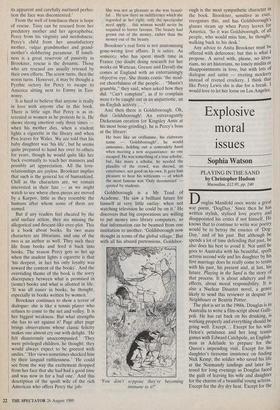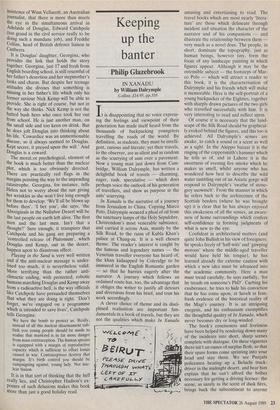Explosive moral issues
Sophia Watson
PLAYING IN THE SAND by Christopher Hudson
Macmillan, 02.95, pp. 240
Douglas Manifold once wrote a great war poem, 'DogDay.' Since then he has written stylish, stylised love poetry and disappointed his critics if not himself. He knows that to continue to write war poetry would be to betray the essence of 'Dog Day,' and of his past. But although he spends a lot of time defending that past, he also does his best to avoid it. Not until he goes to Australia with his beautiful, spoilt actress second wife and his daughter by his first marriage does he really come to terms with his past, his present and, at last, his future. Playing in the Sand is the story of that process. It is about adultery and its effects, about moral responsibility. It is also a Nuclear Disaster novel, a genre likely to send this reviewer in despair to Neighbours or Beatrix Potter. The plot is set in the 1960s. Douglas is in Australia to write a film-script about Galli- poli. He has cut back on his drinking, is working properly and everything should be going well. Except... Except for his wife Helen's petulance and her long tennis games with Edward Catchpole, an English- man in Adelaide to prepare for the Queen's impending visit. Except for his daughter's tiresome insistence on finding Nick Kemp, the soldier who saved his life at the Normandy landings and later lis- tened for long evenings as Douglas faced the guilt of leaving his wife and daughter for the charms of a beautiful young actress. Except for the dry dry heat. Except for the
insistence of Winn Vellacott, an Australian Journalist, that there is more than meets the eye in the simultaneous arrival in Adelaide of Douglas, Edward Catchpole (too grand in the civil service really to be doing such a mundane job), and Freddie Collins, head of British defence liaison in Canberra.
It is Douglas' daughter, Georgina, who Provides the link that holds the story together. Georgina, just 17 and fresh from English boarding school, is still resentful of her father's desertion and her stepmother's looks and charm. But despite her teenage attitudes she divines that something is missing in her father's life which only his former saviour Nick Kemp will be able to Provide. She is right of course, but not in the way she thinks. Nick Kemp is not the hatted bush hero who once took her out from school. He is just another man, on the small side and too keen on drink. But he does jolt Douglas into thinking about his life. 'Cowardice was an unmentionable disease, so it always seemed to Douglas. Kept secret, it preyed upon the will.' And Douglas is a coward.
The moral, or psychological, element of the book is much better than the nuclear Plot, which is too obviously directed. There are practically red flags in the margins pointing the way to the impending catastrophe. Georgina, for instance, tells Helen not to worry about the sun giving her wrinkles as she won't live long enough for them to develop: 'We'll all be blown up before then'. 'I bet you', she says, 'the Aboriginals in the Nu!labor Desert will be the last people on earth left alive. The first men and the last men. Isn't that a thought?' Sure enough, it transpires that Catchpole and his gang are preparing a `controlled release of Plutonium', which Douglas and Kemp, out in the desert, happen upon to disastrous effect.
Playing in the Sand is very well written and if the anti-nuclear message is under- lined too much, it is nevertheless valid. More terrifying than the rather anti- climactic ending, with protected, robotic humans marching Douglas and Kemp away from a radioactive hell, is the way officials like Catchpole have persuaded themselves that what they are doing is right. 'Don't forget, we're engaged on a programme Which is intended to save lives', Catchpole tells Georgina:
We have the bomb to protect us. Really, instead of all this nuclear disarmament rub- bish you young people should be made to realise that mankind is in far more danger from mass contraception. The human species is equipped with a margin of reproductive capacity which is sufficient to offset losses caused in war. Contraceptives destroy that margin. It's birth control you should be campaigning against, young lady. Not nuc- lear fission.
It is in that sort of thinking that the hell really lies, and Christopher Hudson's ex- posure of such delusions makes this book more than just a good holiday read.











































 Previous page
Previous page